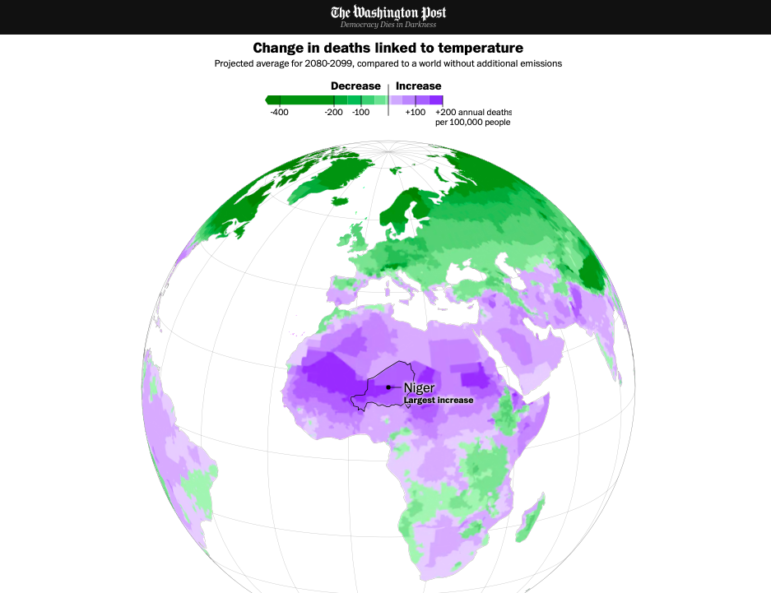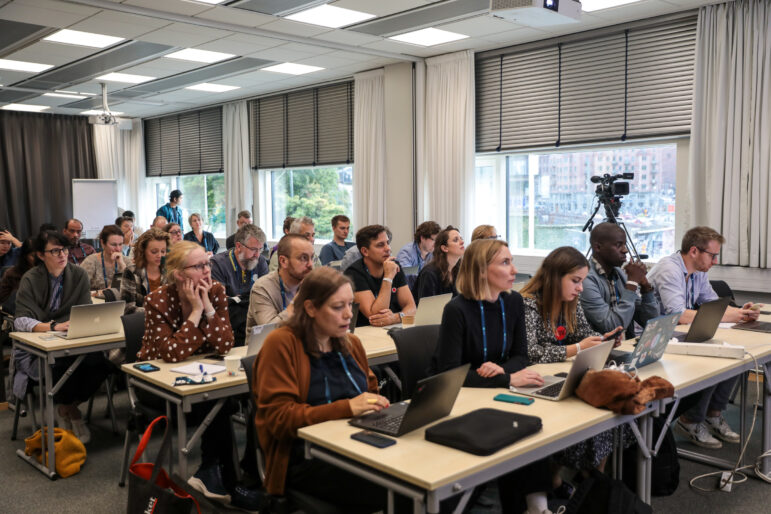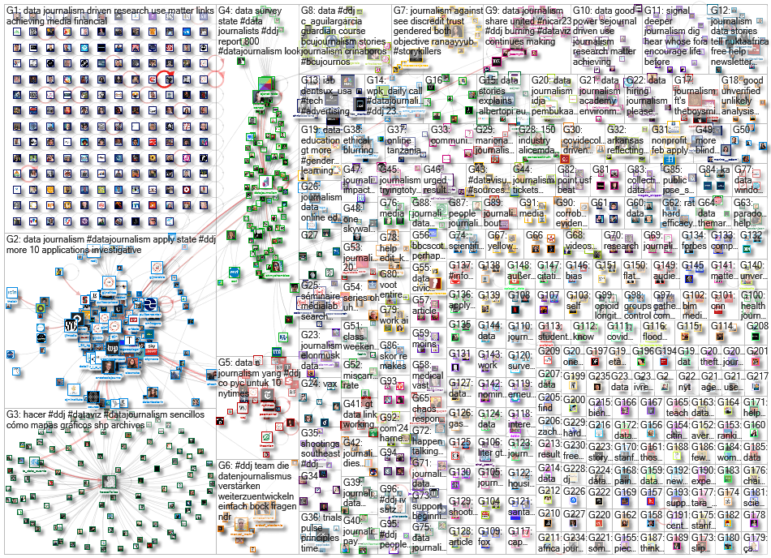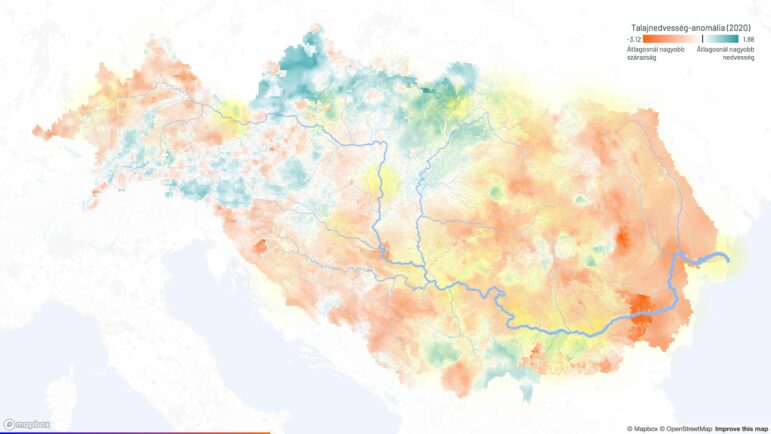

Image: Screenshot, The Washington Post
Data Journalism Top 10: Deadly Cold, Retirement Length, ATM Explosions, Earthquake Damage
If cold temperatures are deadlier than warm temperatures, the question arises: doesn’t that mean global warming is good news? Not quite, as a piece from The Washington Post piece explains. Our weekly NodeXL and human curation of the most popular data journalism stories on Twitter also features stories mapping ATM explosions in Germany, buildings damaged by the earthquakes in Turkey, and several open source mapping alternatives to Mapbox.
Deadly Climate: Cold vs. Hot
Both heat and cold can kill, but cold is still more deadly; for every person that dies from heat exposure, nine die from cold exposure. The Washington Post’s first Climate Lab column, based on the conclusions of two scientific studies on the link between temperature and mortality, explores whether global warming might save lives in the future — in the short and longer term. As with many climate-related issues, it all depends on where you live.
Time Spent in Retirement
Bloomberg looked at which countries have the longest healthy retirement — based on data on life expectancy, healthy life expectancy, and effective retirement age (not state pension age) — to find out how many years we can expect to enjoy a healthy life after leaving the workforce. France, Luxembourg, and Belgium top the chart; Chile, Colombia, and Mexico have the fewest number of healthy retirement years of the countries surveyed. Among other notable trends, overall life expectancy has declined in many countries due to the COVID-19 epidemic.
Exploding ATM Thefts
The data team at German public broadcaster NDR noted a troubling trend in Germany — a rising number of would-be thieves blowing up ATMs to run off with their contents. The explosions also leave buildings in ruins, spark serious fires, and traumatize neighbors. In 2022, there were 493 ATM theft explosions, up from 268 in 2017. The data project includes ATM explosion hotspots (such as Hamburg and Lower Saxony), what proportion of theft attempts are successful, and groups behind these crimes. Bonus: In this short audio clip, Anna Behrend, head of NDR’s data journalism team, gives a quick overview on the team’s work.
Mapping Damage from Turkey’s Earthquakes
The Economist’s Graphic Detail examined satellite images, building maps, and consulted university researchers to estimate building damage and to compare different areas before and after the earthquakes in Turkey. They concluded that poor areas suffered around 3.5 times more damage than wealthier areas. It’s clear that shoddy construction and flimsy buildings exacerbated the earthquake damage, but poorer areas were far more vulnerable, as were areas with clusters of tall buildings, or where identical blocks of flats fell together.
Analyzing Sexual Assault Sentences
In August 2022, Spain passed the so-called “only yes is yes” law, establishing that consent for sexual activity must be clearly affirmed and cannot be assumed by default or silence — and removing the distinction between sexual abuse and sexual assault. In response to Spanish courts’ having reviewed 40% of sexual assault cases five months after the law came into force, El Pais took a closer look at the whys and hows of sentence reductions, which happened in 30% of reviewed cases so far.
Britain’s Generational Wealth
British society has become more equal since the Victorian era, but thanks to a booming property market and a strong culture of inheritance (via the particularly generous “bank of mom and dad”), wealthy British families have been very successful at staying wealthy. Sunday Times’ data editor Tom Calver dug into the issue of generational wealth disparity and notes that families that were wealthy in Victorian Britain have managed to stay wealthy into the 2000s — over five generations. In Nordic countries where wealth is more evenly distributed, and in other European countries, it’s harder to predict wealth based on parents’ income. And as people in the UK are now on average less wealthy than their parents were, receiving gifts or inheriting property is widening the wealth gap. Read a summary of the story here.
The Life of Non-Ethnic Russians Inside Russia
To give a glimpse into the struggles that Russia’s ethnic minorities face and to understand the level of state support they receive, Russian independent news site 7×7, based in the Komi Republic, interviewed representatives from several minority communities and examined various datasets. The journalists also looked at whether these minorities were slowly losing touch with their native language.
Comeback of the Rom-Com?
A team at Reuters analyzed the top-grossing films in the US since 1980, and found that movie-goers have been falling out of love with romantic comedies since the early 2000s — after a golden age for rom-coms in the 1990s. Following a peak of rom-com box office hits, studios started to prioritize films with higher budgets and visual effects. But looking at box office data — including a fun visual constellation of the actors whose careers were launched by rom-coms — only tells part of the story, as streaming services might well usher in a resurgence of the genre. Also don’t miss The Economist’s list of the top 15 most expensive cities to go on a romantic date. Spoiler: Shanghai, New York, and St Petersburg top the chart.
State of Data Journalism 2022
Datajournalism.com conducted its annual survey with responses from more than 1,800 data journalists, and distilled the findings into a collection of insights on trends, tools, and trajectories. Special attention went to the impact of the war in Ukraine following Russia’s invasion a year ago. For example, 20% of data journalists surveyed reported on the conflict in Ukraine. Also, one in three data journalists is entirely self-taught. Read the full report or download the data here.
Super Bowl Star Power
Let’s face it, for a subset of Americans and the world, the National Football League’s annual Super Bowl is more popularly known for its halftime show entertainment than the actual football teams competing. In an attempt to rank the star power of each year’s performer or performers, FiveThirtyEight created its own fun, cheekily-named metric system: MARIAH, or the Metric for Appraising Records, Indexed to Analyze Halftimes. It takes into consideration the staying power of an artist’s songs on the Billboard Hot 100 chart with different weightings for different criteria. Based on the calculation, singer Rihanna, who just performed at this year’s event, has the highest MARIAH score.
Bonus: Open Source Mapping Solutions
Kevin Schaul, graphics reporter at The Washington Post, usually relies on Mapbox for his mapping needs, but he finds that it’s gotten too expensive. Schaul suggests four open source alternatives — OpenMapTiles, Maputnik, PMTiles, and Maplibre — that could work for data journalists everywhere, from building tiles to style editing.
Thanks again to Marc Smith and Harald Meier of Connected Action for gathering the links and graphing them. GIJN’s Data Journalism Top 10 list is curated weekly.
 Alexa van Sickle is an associate editor at GIJN. She was previously a senior editor for the foreign correspondence magazine Roads and Kingdoms. She has also been an editor at the International Institute for Strategic Studies and a publisher at an international law non-profit in London. She lives in Vienna, Austria.
Alexa van Sickle is an associate editor at GIJN. She was previously a senior editor for the foreign correspondence magazine Roads and Kingdoms. She has also been an editor at the International Institute for Strategic Studies and a publisher at an international law non-profit in London. She lives in Vienna, Austria.
 Eunice Au is GIJN’s global team manager based in Budapest, Hungary. Previously, she was a Malaysia correspondent for Singapore’s The Straits Times, and a journalist at Malaysia’s New Straits Times. She has also written for The Sun, Malaysian Today, and Madam Chair.
Eunice Au is GIJN’s global team manager based in Budapest, Hungary. Previously, she was a Malaysia correspondent for Singapore’s The Straits Times, and a journalist at Malaysia’s New Straits Times. She has also written for The Sun, Malaysian Today, and Madam Chair.










